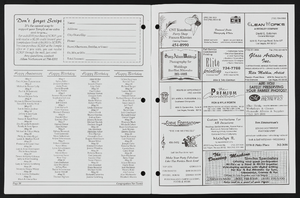Search the Special Collections and Archives Portal
Search Results

James L. Hogan interview, March 11, 1978: transcript
Date
Archival Collection
Description
On March 11, 1978, collector Patty L. Baratti interviewed James Hogan (born April 6th, 1909 in Winton Place, Ohio) at his home in Las Vegas, Nevada. In this interview, Hogan talks about his time working with the telephone company in Arizona and moving to Las Vegas, Nevada. He discusses his time working on grazing rights and cattle ranching in Nevada and how planning went to ensure that farms were able to have land to graze their animals. He speaks about dealing with farmers, corporations, and the government and the frustrations he had to deal with before there were set laws about grazing. He also discusses the change from mainly family farms in Nevada to corporations owning much of the farmland.
Text

Interview with Ian Dominic Zabarte, April 4, 2007
Date
Archival Collection
Description
Access note: Audio temporarily sealed. May not quote in any form without written permission from interviewee
Text

Preprint, Where I Stand: The Record of a Reckless Man, by Hank Greenspun with Alex Pelle, 1966
Date
Archival Collection
Description
Book proof with annotations from editors in the margins.
Text

Sandra Gray oral history interview: transcript
Date
Archival Collection
Description
Oral history interview with Sandra Gray conducted by Elsa Lopez and Barbara Tabach on December 13, 2019 for the Latinx Voices of Southern Nevada Oral History Project. In this interview, Dr. Gray discusses her family history, and describes how her parents are immigrants from Durango, Mexico and moved from East Los Angeles, California to East Las Vegas, Nevada in 1991. After getting her bachelor's degree in psychology from the University of Nevada, Las Vegas (UNLV) she started a behavioral health agency that provided rehabilitative mental health services to children primarily in the foster care system. She went on to earn a master's degree in mental health counseling, a master's in psychology, and a doctoral degree in clinical psychology. She is the founder of Empower LV, which strives for equitable access to sports and tutoring. Dr. Sandra Gray is also the owner and operator of Innovation Behavioral Health Solutions, LLC.
Text

Transcript of interview with Tony Scodwell by Lisa Gioia-Acres, September 29, 2008
Date
Archival Collection
Description
Tony was born the only son of the only son in Beloit, Wisconsin. Following his parents divorce when he was 12, he and his father went to live with his grandparents who, he admits, spoiled him. While neither of his parents played a musical instrument, Tony’s grandmother was a professional organist. In addition, Tony had an uncle who was a professional saxophone player and who was an inspiration to him. Tony’s dad was very supportive of his decision to learn trumpet and rented Tony an instrument, took him to his lessens, and sat with him while he practiced. Tony was firm in his convictions by the 9th grade that he was going to be a musician. Following high school, Tony was awarded a full scholarship to the Berklee School of Music in Boston which was a very prestigious music school. Tony repeatedly left school to go on the road which the school fully expected of their students. The last time he left the school he never went back. Tony states he got his degree on the road with experience from playing in bands like Stan Kenton, Tommy Dorsey, and with his idol Harry James. Tony took his career abroad when he took up residence in Cologne, Germany to play with a band there. Tony came to Las Vegas to play in a band with Buddy Rich which turned out to be of a shorter duration than he expected. Tony then played in Las Vegas and Reno for a time before going back on the road after realizing he preferred playing jazz on the road as opposed to playing in show bands. After eight years on the road, Tony returned to Las Vegas, got married, and settled down. Aptitude tests proved accurate when they showed Tony had a talent for things mechanical and metal as Tony went on to manufacture trumpets in addition to playing them. One can feel the love Tony has for his trumpets as he describes the process of creating them. After playing trumpet for almost 30 years, Tony decided it was time to concentrate on his photography for a while. Tony does not consider himself retired, but rather he likes to play, take pictures, and, of course, he practices the trumpet every day.
Text

Nora Mirabal interview, August 30, 2019: transcript
Date
Archival Collection
Description
Interviewed by Elsa Lopez and Barbara Tabach. Cuban refugee family by way of Spain and then to the US; arrived in Las Vegas in 1973 when Nora was 9 years old. Struggled in youth but rises up as embraces educaton. Currently is Assistant Director of Academic Partnership at CSN.
Text

Transcript of interview with Jan Kennedy by Barbara Tabach, September 7, 2011
Date
Archival Collection
Description
Jan Kennedy was born (1924) Janet Parmelee, the daughter of a Connecticut physician and a homemaker. In high school she met Norman Kennedy, who she would marry after both had attended college and to whom she was married for 64 years. Until 1963, their roots seemed to be taking hold in the Seattle area. That is until Norm was offered an attractive career opportunity as a weather man at the Nevada Test Site. They settled in and enjoyed a zest-filled life with their four sons and a dynamic group of friends who they often entertained at their cabin in Mount Charleston. In addition, Jan managed to volunteer for a list of organizations including UMC Hospital/Southern Nevada Memorial Hospital; Clark County Museum Guild; Salvation Army Women's Auxiliary; church deacon; Assistance League; Red Hats—keeping herself ever busy and joyfully satisfied.
Text

Transcript of interview with Flo Mlynarczyk by Claytee White, July 7, 2005
Date
Archival Collection
Description
Flo Mlynarczyk began life in Fort Morgan, Colorado. Her parents divorced and she moved with her mother first to Loveland and eventually to Los Angeles. Her mother started the first Red Cross in Bell Gardens, oversaw the building of their home, and raised money for various charities. Flo remembers when the Japanese were rounded up and interred during WWII. She was in grade school and recalls that one day they all just disappeared. Upon graduation from high school in 1943, Flo moved to Kodiak, Alaska, to live with friends. She recalls total blackouts on the streets of Kodiak due to the war, the Short Snorter Club, and her return to California after a bout of pneumonia. Back in Bell Gardens, Flo worked for a department store, married and divorced in 1945, gave birth to her son Michael in 1946, and ended up in Tonopah, Nevada, with a sister who ran a cafe there. After a second marriage ended, Flo moved to Las Vegas and began working at Phelps Pump and Equipment as a bookkeeper.
Text


